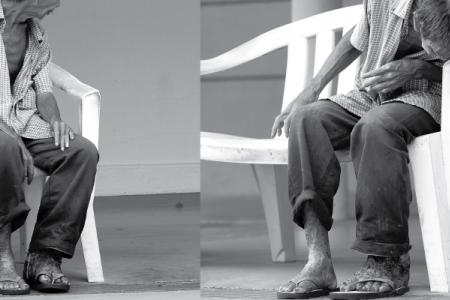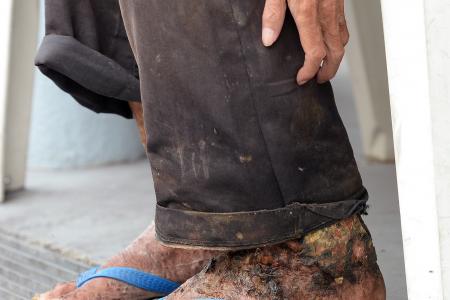Social worker on Mr Lim: 'Our hands are tied'
Social workers have been aware of Mr Lim's case since the start of last year.
And they have tried all ways to get him to receive medical help.
Ms Grace Lee, group director of seniors services at Care Corner Seniors Services (CCSS), says: "Our hands are tied. We know of other cases like this, but Mr Lim's is complex."
This is because he has rejected all medical assistance offered to him.
"He does not want to lose his leg even though he must be suffering from much discomfort because of it," says Ms Lee.
"Should we call for an ambulance, he can still refuse to step in. There is very little we can do to get him to seek medical treatment if he refuses to give consent."
Ms Lee tells The New Paper on Sunday that Mr Lim is suspected of suffering from a form of dementia and that he "may not be able to make a proper judgment of his situation".

But Mr Lim has refused to cooperate with Institute of Mental Health's professionals when they visited him, she adds.
CCSS is also working with the National Healthcare Group, which has sent health workers to see Mr Lim.
Ms Lee says: "But they are unable to diagnose him as he is required to go to hospital for further tests for an accurate diagnosis."
There are no records of Mr Lim ever visiting a clinic or a hospital.
Despite the challenge, CCSS' social workers are not about to give up, says Ms Lee.
SMALL STEPS
"Not only are we monitoring this case but we are also trying to intervene, taking small steps at a time."
Already, some progress has been made. Last August, Mr Lim consented to a suggestion from his sister to accept financial help from the Government. He now receives $300 a month from the Ministry of Social and Family Development (MSF).
An MSF spokesman, who confirmed the assistance, adds: "As we strive to provide support to the needy in our community, we are also mindful that some prefer to be self-reliant and decline assistance.
"Nevertheless, MSF and our partners in the community will continue to watch over them and render aid where needed."
When TNPS, accompanied by Madam Lim, visited Mr Lim at his home on Wednesday, there were two nurses from the Virtual Hospital at Tan Tock Seng Hospital who wanted to assess his leg.
Mr Lim initially rejected any suggestions from the health workers but eventually relented to letting them see both his legs and to take tissue samples from them.
This was after Madam Lim threatened to "take back the money" if he continued to be stubborn.
This money is the household allowance that she has been giving him out of her own pocket.
Still, there is no guarantee that Mr Lim would be willing to continue with the treatment - especially if the treatment includes amputation.
But for Madam Lim, this is a positive first step.
As she busies herself cleaning the flat, she says: "I am so happy. I have tried for years to get him to accept help. This is a start."
Treatment cannot be forced on unwilling
Why can't the authorities or health professionals authorise treatment on unwilling persons suffering from serious conditions?
In Singapore, patient autonomy is upheld by law.
There is a precedent in the case of Madam LP in 2006. A Singaporean woman suffering from diabetic gangrene refused to amputate her diseased leg until she went comatose in Mount Alvernia Hospital.
Doctors petitioned the court in the first of such a case here.
Justice Choo Han Teck ruled that the adult patient "was entitled to give or withhold consent to any medical treatment and doctors are obliged to respect that person's decision".
Why can't Mr Lim's sister give permission on his behalf, for his best interests?
In Madam LP's case, Justice Choo ruled that "No one else, however close by reason of kinship or friendship, was legally entitled to make that (medical) decision for the patient."
He also added: "The best interests of the family are not to be confused with the best interests of the patient."
But family members can apply to be appointed as deputies and make decisions of the patient under the Mental Capacity Act (MCA).
This applies only when the patient lacks the mental capacity "to make a decision for himself in relation to the matter because of an impairment of, or a disturbance in the functioning of, the mind or brain."
But in Mr Lim's case, he has not been diagnosed with any mental condition and hence, the MCA does not apply.
Is it not enough that social workers already suspect that Mr Lim is also suffering from a mental illness?
To be deemed as mentally incapable, Mr Lim must be properly diagnosed by a certified mental health professional.
But to do so, he must give consent and cooperate with the assessment, which he has not done.
This is despite joint efforts from Care Corner Seniors Services (CCSS), National Healthcare Group and Institute of Mental Health, says CCSS' group director Grace Lee.
Woman would rather die than amputate legs
From the start, Madam LP - as she is known in court papers - did not want her legs amputated.
This was in 2006. Madam LP was 51 at the time and her son, her only relative, was 16.
The previous year, the insurance and real estate agent admitted herself into Gleneagles Medical Centre after she accidentally burned herself with a hot water bottle. Because of her diabetes, the burns resulted in an infection.
Complaining of a pain in both feet, she was told by two hospitals that her right leg had to be amputated.
She was eventually persuaded to amputate her right toe but was adamant in refusing the amputation of her leg despite the doctor's advice.
But the viral infection spread. Soon, both legs became infected with diabetic gangrene.
The instruction to the doctors were clear: Save the legs at all costs. No amputations.
She also said to her son that she would rather die than lose her legs.
COMA
Shortly after, Madam LP suffered from a septic shock that put her in a coma and she ended up in Mount Alvernia Hospital.
Her doctor at the time, orthopaedic surgeon Tan Mak Yong, met with other specialists and concluded that Madam LP would die if her legs were not amputated.
Only her son was told this. Madam LP was not told that she could die before she went into a coma.
The teen's father was in the Philippines and could not be contacted, according to court papers. He was not married to Madam LP.
Without Madam LP's consent, doctors could not proceed. So they turned to the court for an operation to remove her legs and save her life to be made legal.
In the High Court, Justice Choo Han Teck urgently convened a hearing.
He considered that even though Madam LP had said she would rather die than amputate her legs, that comment was "probably made without the benefit of medical advice of impending death".
The operation would also be in her best interests, he said then.
Ultimately, he gave the green light to the operation. But Madam LP woke up from her coma during pre-surgery tests, putting a halt to the operation.
Thankfully, she got out of danger and did not require the surgery. And should the need arises, the doctors would have to seek her consent again.
It is not known what has happened to Madam LP since then.
Get The New Paper on your phone with the free TNP app. Download from the Apple App Store or Google Play Store now




